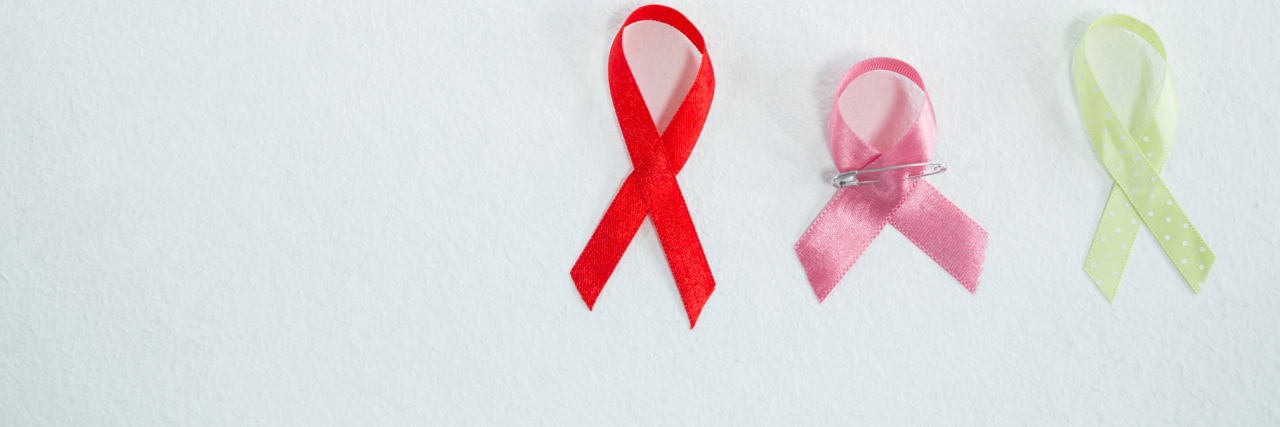What the Rest of Us (Cancer Patients and Survivors) Can Learn from Pinktober
October, as most of us know, is Breast Cancer Awareness Month.
It’s hard not to know. Sometimes it feels like we’re surrounded by pink — in the grocery store, on the ball field, on social media. Lots of people are invested in making us aware of breast cancer for 31 days.
As a cancer patient myself (follicular lymphoma, an incurable blood cancer), I have mixed feelings about it all.
Let’s get the complaints out of the way.
I think lots of cancer patients and survivors share the same feelings about the month, including many with breast cancer. There’s the pinkwashing, where business will wrap their products in pink breast cancer-friendly packaging, promising to donate a portion of proceeds to breast cancer research and awareness, sometimes not fulfilling their promises, and sometimes just hopping on the bandwagon to sell their products.
Other businesses will offer support for the cause, while selling products that may increase the risks of getting breast cancer.
Others might just misrepresent the cancer experience.
All of this in the name of “awareness.”
And, as a cancer patient, I’ll admit to a little jealousy. Blood Cancer Awareness Month is in September; I’d be thrilled to see an entire professional sports league with the lime green ribbons of non-Hodgkin’s lymphoma on their shirts and helmets for a week, or my supermarket selling cupcakes with orange frosting in support of leukemia research (or lavender for Hodgkin’s lymphoma, or burgundy for myeloma).
There are plenty of businesses that do support blood cancer research and awareness, but not nearly as many as the ones who are so busy in October.
I said I have mixed feelings, and I do. As much as I am frustrated by what Pinktober has become, part of me sees the value in raising awareness. And there is a lot of value.
I’m old enough to remember, as a kid, hearing my parents talk about friends or family members with cancer. Only they didn’t say “cancer.” They said “(((((cancer)))))” with their voices falling to a whisper. There was a time when people didn’t talk openly about cancer. In many cases, it was almost something to be ashamed of.
The writer Susan Sontag, a breast cancer patient herself, wrote about the ways people used to talk about cancer, and the ways they didn’t talk about it.
Obituaries didn’t mention cancer; they said someone “died after a long illness.”
Many doctors sometimes didn’t even give patients the cancer diagnosis directly; they’d tell the family instead, because cancer patients weren’t considered strong enough to handle the news.
Sontag wrote she once spoke to a “leading oncologist” in France who estimated that fewer than 10 percent of his patients even knew that they had cancer (though their families knew).
Things began to change in the 1970’s, when Betty Ford, then First Lady of the United States, had a mastectomy. And she let the world know, believing that transparency was important. Historians talk about a “Betty Ford Blip” — a rise in the number of women who began to do breast self-exams at Ford’s urging and who were then diagnosed.
It slowly became OK to talk about cancer.
There’s more to the history of breast cancer awareness than I am giving here; it’s more complicated.
But the lesson, for me, holds true anyway — we can’t go back to a time when cancer was something to be ashamed of. It seems unlikely it will happen, given how much of our lives we tend to share these days on social media.
Still, I could envision a kind of Pinktober backlash, too, where people get cynical and sick of hearing about cancer, especially if “awareness” is associated with some kind of marketing scam. I could also envision a world where our health care system gets to a point where cancer patients think it would better if other people didn’t know that we had cancer, because pre-existing conditions would only cause problems.
Again, it seems unlikely, but it’s possible.
As cancer patients, survivors, caregivers, and advocates, we can’t let that happen.
We need to make sure it’s always OK for people to talk about cancer.
We need to continue to share our stories.
We need to make awareness be about us, not about products.
But our own individual stories won’t tell the whole story.
We need to pass along solid, science-backed information.
We need to encourage family and friends to learn about cancer prevention, and encourage them to make lifestyle changes that can help.
We need to encourage others to understand early detection, and encourage them to follow through with appropriate tests — even (maybe especially) the ones that are inconvenient or uncomfortable.
We need to encourage current patients to learn more about their disease — enough to have informed conversations with their doctors, so they have a voice in the choices that affect them.
“Awareness” is about more than colored bread wrappers and drill bits. But it starts with making people aware.
What happens after that is up to the rest of us.
Thinkstock photo by Wavebreakmedia

